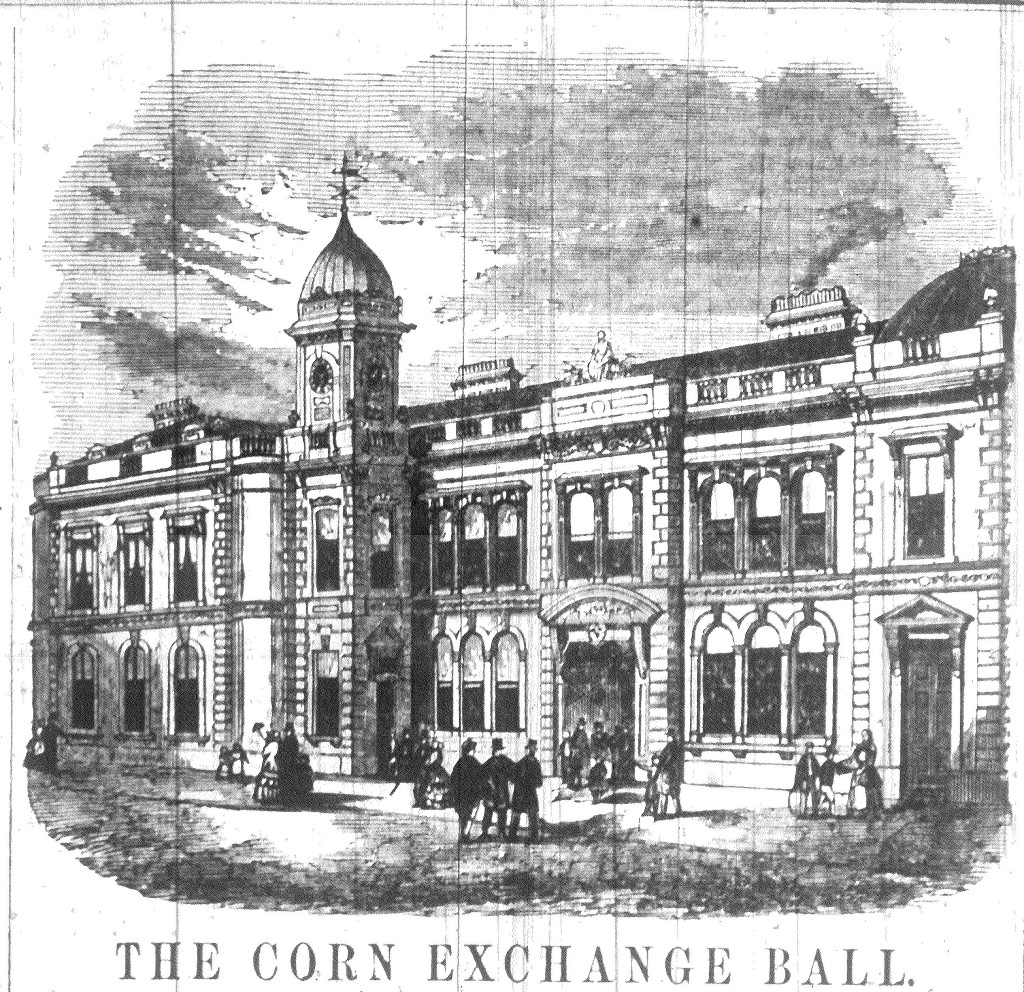TEA TO OLD LADIES IN BERWICK
The “Advertiser” Opens a Fund
Captain Douglas, the local commanding officer of the Salvation Army, is arranging to give a free tea on Wednesday afternoon, January 12th, to all women in Berwick, Tweedmouth and Spittal, who are in receipt of an old age pension. The tea will be given in the Salvation Army Hall, Quay Walls, and will be followed by a musical entertainment.
The Captain is handing over the work of organisation to the troop of Life-saving Guards, which has recently been started in connection with the Army’s work. This troop is composed of girls between the ages of 11 and 18, and the girls may be recognised in the street by their light grey uniform and red trimmings. The motto of the troop is “To Save and to Serve.” The girls will visit old and sick people in their homes, will be trained in domestic and nursery work, and can be called upon by any in the town who are in need of free domestic or nursing assistance.
It is felt that the work of the Guards will be brought before the ladies in the town who have very few to look after them if they are given the chance of meeting together at the tea and entertainment on January 12. Old folk who are not able of themselves to get to the tea will be helped there by the Guards. The Army is taking the financial responsibility for this tea, but it feels that it can rely upon the generosity of the public of Berwick to subscribe liberally. It is estimated that the tea will cost about 1s 6d per head, and that there will be about 200 old ladies present – a total expenditure of £15. We have agreed to open a fund in the “Berwick Advertiser,” and will acknowledge next week and the following weeks the subscriptions we receive.
LOCAL NEWS
At mid-day on Monday morning, Mr J. A. Young, of the Pier Road maltings, Berwick, had a narrow escape from drowning. He was running along the pier and fell into the water at crabwater corner.
He struck out for the steps, and although the tide was fast running out, he managed to catch the hand of Miss Bella Stewart, who works at his own malting. Great praise is due to the prompt way in which Miss Stewart rendered assistance, and there is a feeling in the town that her gallantry should be recognised. We understand, up to the time of writing, Mr. young, who was able to walk home has suffered no ill effects of his emersion.
On Friday evening, Messrs Millers, F.A.I., offered for sale by auction in the Long Room, Corn Exchange, several lots of property in Berwick. The attendance was small, owing no doubt to the very stormy night. The first lot comprised all the freehold shop, dwelling houses, workshops, stables and stores, Nos. 13, 15 and 17 Woolmarket, at present occupied by Messrs Steel, Thompson and Patterson, Miss Phillie Bruce, Mr John brown, Messrs John Brown and Sons, and Mrs McAllum.
The total rental for this lot amounts to £52 16s. Bidding started at £300 and rose fairly quickly to £750, when the lot was withdrawn. No. 1 Ivy Place held on leases of 150 years, dating from 1859, from the Corporation and with an annual rental of £22, only brought one bid of £200 and was withdrawn. A similar fate befel No. 2 Ivy Place, which is a slightly larger house, with a rental of £24. Only one bid of £200 was forthcoming, and the lot was withdrawn. It was intimated that No. 3 Ivy Place had been disposed of privately. The conditions of sale were read by Mr J. Bate, solicitor.
While walking along the beach at the Sandybeds, a mile and a half north of Berwick, on Monday afternoon, Alexander Manuel, sen., 19 Low Greens, picked up a drop end flask sealed with a black solution and bound round the neck with a two-feet strand of copper wire. As the bottle had a printed enclosure (in four languages), Mr Manuel handed it oever to the Receiver of wrecks, who opened it. A half-penny was found between the seal and the cork of the bottle, and inside was a printed postcard asking the finder to return it to the Scientific Superintendent of the Marine Laboratory of the Fishery Board of Scotland, Bay of Nigg, Aberdeen. It is the practice of the Fishery Board to liberate these bottles from time to time at various places to test the set of ocean currents, etc.
NORHAM AND ISLANDSHIRE RURAL
DISTRICT COUNCIL
Overcrowding at Beal
When the Council considered the various items in the doctor’s report, Dr McWhir asked to be allowed to supplement what had written regarding the overcrowding in the cottages at Beal. In one cottage six people lived – a father, mother, a young woman of 22, a young man of 20 and two lads of 15 and 12 years. The father and mother slept in one bed in the kitchen, the young man of 20 and the lad of 15 in another bed, and the lad of 12 in a bed chair. The young woman slept in the other room. The kitchen, where the five people slept, was 15ft. 6in. By 17 ft. and 7 ft. 9 in. High. This meant 2042 cubic feet of air for five persons. This family had, said Dr McWhir, gone to Beal Faram with Mr Davidson from Cornhill 30 years ago. In another cottage there were living a woman 64 years of age and a young woman of 34, three young men of 29, 25 and 19 years, and a girl of 12. In this instance the three men slept in one room, and the woman and the girl in the other. Asked as to what condition the empty cottage was in, Dr McWhir said it was very bad and had not been occupied for 30 years.
As this was the first time the cottages had been reported upon, it was agreed to send a copy of the Doctor’s report to both the agent and the tenant. It was also agreed that steps could very easily be taken to remove the earth from the back of the cottages and have the ashpits attended to.
UNEMPLOYMENT IN BERWICK
As far as we can gather there are 200 unemployed men in Berwick. There is a slump in trade all over the country, men are out of work, and industries are going on short time. In Berwick just now seasonal unemployment is at its height, but the great majority of the unemployed in the Borough are unskilled workmen. Is it not time for those in authority to begin working out a scheme for providing employment? It is being recognized generally that each industry should bear the burden of its own unemployed, and this is being arranged for, for instance, in the transport and building industries. This, however, will not help casual labourers, who are not affiliated to any special industry. As we have already pointed out, the work at Mordington, the steel factory, the Tweedmouth housing scheme, and even the new bridge, when it is started, if they absorb all the unskilled labour in Berwick while they are in operation, will not permanently solve the problem. On the other hand, a proportion of the men now unemployed never have done regular work and will need a lot of coaxing and training before they take to it. They prefer to work for two or three days and take a rest, or perhaps for a little longer, but always with a rest at the end of it. Men like this are a very real difficulty. The vigorous insistence on decent housing conditions will help us here. In eighteen months’ time we hope to have 68 new houses up in Tweedmouth. That will enable the medical Office of health and the Inspector of Nuisances to have some of the worst houses in Berwick pulled down. The people who leave these houses will have to go into more expensive houses, which means that they will have to work something like a full week to pay the rent and keep themselves in comfort. Gradually society will realise that the man who does not put in a fair week’s work, be he rich or poor, is a public danger. That, however, is for the future. We know what has happened in other towns which are suffering from unemployment and we have 200 unemployed unskilled workmen in Berwick. The time, we think, has come for the mayor to call a public meeting to discuss what can be done in the way of starting relief measures for those willing to work. It is for such a meeting to decide on the particular measures to be taken. May we suggest- we do no more- that the Borough might set the unemployed to make bricks or concrete block for housing. They are already being made at Mordington by practically unskilled labour with a few skilled supervisors. We have still hundreds of houses to put up in Berwick which can use them, and new houses are to be out up in Belford, Glendale and Norham and Ilandshires. The Government would give financial aid to such can be offered to the unskilled workmen, we shall have provided a test which will give a job to every man willing to work. When we have sifted out those who prefer irregular work or not to work at all, and are sure of our ground, we shall no doubt be able to solve that problem too.










